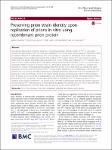Preserving prion strain identity upon replication of prions in vitro using recombinant prion protein
Makarava, Natallia
Savtchenko, Regina
Lasch, Peter
Beekes, Michael
Baskakov, Ilia V.
Last decade witnessed an enormous progress in generating authentic infectious prions or PrPSc in vitro using recombinant prion protein (rPrP). Previous work established that rPrP that lacks posttranslational modification is able to support replication of highly infectious PrPSc with assistance of cofactors of polyanionic nature and/or lipids. Unexpectedly, previous studies also revealed that seeding of rPrP by brain-derived PrPSc gave rise to new prion strains with new disease phenotypes documenting loss of a strain identity upon replication in rPrP substrate. Up to now, it remains unclear whether prion strain identity can be preserved upon replication in rPrP. The current study reports that faithful replication of hamster strain SSLOW could be achieved in vitro using rPrP as a substrate. We found that a mixture of phosphatidylethanolamine (PE) and synthetic nucleic acid polyA was sufficient for stable replication of hamster brain-derived SSLOW PrPSc in serial Protein Misfolding Cyclic Amplification (sPMCA) that uses hamster rPrP as a substrate. The disease phenotype generated in hamsters upon transmission of recombinant PrPSc produced in vitro was strikingly similar to the original SSLOW diseases phenotype with respect to the incubation time to disease, as well as clinical, neuropathological and biochemical features. Infrared microspectroscopy (IR-MSP) indicated that PrPSc produced in animals upon transmission of recombinant PrPSc is structurally similar if not identical to the original SSLOW PrPSc. The current study is the first to demonstrate that rPrP can support replication of brain-derived PrPSc while preserving its strain identity. In addition, the current work is the first to document that successful propagation of a hamster strain could be achieved in vitro using hamster rPrP.
Files in this item
Related Items
Show related Items with similar Title, Author, Creator or Subject.
-
2016-01-04ZeitschriftenartikelDisease Transmission by Misfolded Prion-Protein Isoforms, Prion-Like Amyloids, Functional Amyloids and the Central Dogma Daus, Martin L.In 1982, the term “prions” (proteinaceous infectious particles) was coined to specify a new principle of infection. A misfolded isoform of a cellular protein has been described as the causative agent of a fatal neurodegenerative ...
-
2016-09-09ZeitschriftenartikelReversible off and on switching of prion infectivity via removing and reinstalling prion sialylation Katorcha, Elizaveta; Daus, Martin L.; Gonzalez-Montalban, Nuria; Makarava, Natallia; Lasch, Peter; Beekes, Michael; Baskakov, Ilia V.The innate immune system provides the first line of defense against pathogens. To recognize pathogens, this system detects a number of molecular features that discriminate pathogens from host cells, including terminal ...
-
2013-03-11ZeitschriftenartikelTowards further reduction and replacement of animal bioassays in prion research by cell and protein misfolding cyclic amplification assays Boerner, Susann; Wagenführ, Katja; Daus, Martin L.; Thomzig, Achim; Beekes, MichaelLaboratory animals have long since been used extensively in bioassays for prions in order to quantify, usually in terms of median infective doses [ID50], how infectious these pathogens are in vivo. The identification of ...

